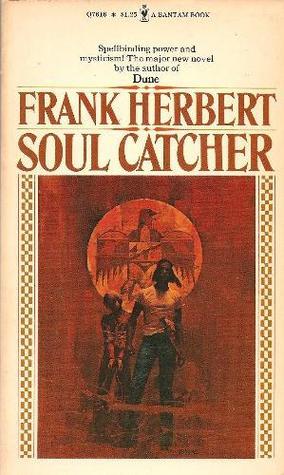Soul Catcher, by Frank Herbert
 Frank Herbert's single non science fiction book tells the story of a heartbroken native American who embarks on a journey to create a spiritually significant event against the White people who wronged him and his kind. But since nothing is simple with Herbert, the plot is about the relationship between our antihero and his victim. If nothing else, it's a great exploration of Stockholm Syndrome, but also things the author was fascinated with: the power of stories to change reality, the impact of cultural absorption and the power of tribal ritual to fight against it.
Frank Herbert's single non science fiction book tells the story of a heartbroken native American who embarks on a journey to create a spiritually significant event against the White people who wronged him and his kind. But since nothing is simple with Herbert, the plot is about the relationship between our antihero and his victim. If nothing else, it's a great exploration of Stockholm Syndrome, but also things the author was fascinated with: the power of stories to change reality, the impact of cultural absorption and the power of tribal ritual to fight against it.
While reading the book I got a feeling that made me remember Tom Sawyer trying to escape Injun Joe. It has the same kind of remoteness, the innocent White boy and the native American antagonist dynamic, but while that book was simple and focused on the mentality of regular American people (even the "injun"), Soul Catcher explores how kidnapper and victim create a rapport, how the beliefs of one person can infect others if presented with sufficient confidence, the way two cultures cannot understand each other sans a common language.
You see, Charles Hobuhet is not a wild rebel, dressed in animal skin and shooting arrows from horses, he is an educated American of native origins whose job is to train young boys in the ways of nature in a natural reserve. A traumatic event (reminiscent of the one starting things in White Plague) makes him "snap". But what does that mean? Is his quest the fevered revenge dream of a mad man or is it him waking up to the reality of his people's captivity at the hands of the White man? Mirroring this ambiguity in the relationship he has with 13 years old David is the genius of this book. Is it a stupid act to connect with your captor and not work relentlessly to escape? Then are all occupied people like the native Americans stupid? Isn't the first responsibility of a prisoner to escape? Then, to what degree and for how long? Can there ever be peace?
Recently the book rights have been bought in view of making a film out of it, but I doubt it will work. People need to understand the underlying currents in the book and faithfully portray them on screen, regardless of how controversial. The whole point of the story is to make one think and feel themselves in all of the situations. I am afraid Hollywood is unable to go down that path anymore. However, this could just as well be adapted as a theatre play, having just a few characters and focusing heavily on each person's thoughts and motivations, rather than on specific settings.
A very interesting book, with many layers that probably require rereads. Highly recommended.
Comments
Be the first to post a comment